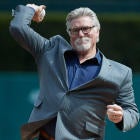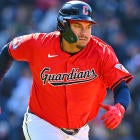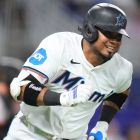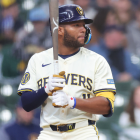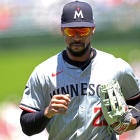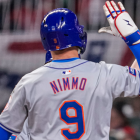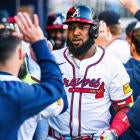While much focus during the offseason is on the BBWAA voting for the Baseball Hall of Fame, there is another route to Cooperstown. The Eras Committees, formerly known as the Veterans Committee, handle that end. Four different eras get one turn per year, with the "Modern Baseball Era" (1970-87) getting a crack this season.
This route is how executives, commissioners, managers, umpires, etc. can get into the Hall, in addition to players who missed the cut via the BBWAA route. One might recall former commissioner Bud Selig made it last year via the Today's Game (1988-present) committee.
The Modern Baseball Era committee will be 16 members, comprised of current Hall of Famers, executives and select media members. In order to gain enshrinement, candidates need at least 12 votes. Each voter only gets to vote for two, so it's pretty tough to make it.
The list of candidates is 10, with nine former players and a former MLBPA head. Here they are, in alphabetical order:
Steve Garvey
In Garvey's 19 years with the Dodgers and Padres, he was the 1974 NL MVP, a 10-time All-Star and four-time Gold Glover. He hit .294 with 440 doubles, 1,308 RBI, 1,143 runs and 2,599 hits. A big-time postseason performer, Garvey played on five different NL pennant winners, one World Series champion and won the NLCS MVP twice. In 55 career postseason games, he hit .338/.361/.550 with 11 homers.
Tommy John
John threw 4,710 1/3 innings over the course of a 26-year career. He won 288 games, pitching to a 3.34 ERA (111 ERA+). The four-time All-Star finished second in Cy Young voting twice and fourth another time. He led the majors in shutouts three times as well. In 88 1/3 postseason innings, John posted a 2.65 ERA. He was the member of three pennant winners, but never won a ring.
Does having the most famous surgery in baseball history named after him carry weight here?
Don Mattingly
Donnie Baseball might already be in the Hall if back injuries hadn't ruined his post-age-30 career. Through his age-28 season, Mattingly was a career .323/.368/.521 hitter while averaging 208 hits, 44 doubles, 27 homers, 105 RBI and 99 runs per 162 games.
In his career, Mattingly was a six-time All-Star, nine-time Gold Glover, three-time Silver Slugger winner and the 1985 AL MVP. He did finish with a nice .307/.358/.471 line, but his counting stats leave a lot to be desired for the Small Hall folks: 2,153 hits, 442 doubles, 222 homers, 1,099 RBI, 1,007 runs.
Marvin Miller
Miller was the executive director of the MLB Players Association from 1966-82. He negotiated the league's first collective bargaining agreement, aided Curt Flood in the eventually successful fight for free agency and generally led the MLBPA to becoming one of the strongest unions in the country.
Miller is the only person on this ballot who has passed away.
Jack Morris
Oh boy, here come the debates again!
Morris was on the BBWAA ballot for the full (at the time) 15 years and fell short. He started with just 22.2 percent of the vote before falling to 19.6 percent in 2001. He would rise pretty steadily to 67.7 percent in 2013, but the number fell to 61.5 percent in his final year, 2014.
Morris was 254-186 in his career with 2,478 strikeouts in 3,824 innings. His 3.90 ERA and 1.30 WHIP and lack of personal, regular-season hardware were his pratfalls. He did win three World Series rings and had some stellar -- one in particular -- postseason performances. He won the 1991 World Series MVP. Overall, though, he was 7-4 with a 3.80 postseason ERA.
Let the yelling begin.
Dale Murphy
Murphy probably felt like a shoo-in by the late eighties. His decline phase didn't treat him well. Still, we're talking about a seven-time All-Star, five-time Gold Glove winner, four-time Silver Slugger winner and two-time NL MVP. He led his league in home runs twice and RBI twice.
The final numbers: .265/.346/.469, 121 OPS+, 2,111 hits, 350 doubles, 398 home runs, 1,266 RBI, 1,197 runs, 161 steals.
Dave Parker
The Cobra spent 19 years in the majors with six different teams, most notably the Pirates. He had five top-five finishes in MVP voting, including taking the hardware in 1978. He was a member of three pennant winners and two World Series champions.
Parker hit .290/.339/.471 with 2,712 hits, 526 doubles, 339 homers, 1,493 RBI, 1,272 runs and 154 stolen bases. He was a seven-time All-Star, three-time Gold Glover, three-time Silver Slugger and two-time batting champion.
Ted Simmons
Of everyone on here, Simmons probably got the most jobbed by the BBWAA, getting just 3.7 percent of the vote in 1994 and falling off the ballot in his first shot. Per the baseball-reference.com similarity scores, the catchers whose careers statistically were closest to Simmons' were Joe Torre, Carlton Fisk, Gary Carter and Yogi Berra. On an individual season basis, the most similar player through ages 22-31 (every single year) was Ivan Rodriguez.
The eight-time All-Star Simmons hit .285/.348/.437 (118 OPS+) in his 21 years. Via the JAWS system, he would be just about average as a catcher among current Hall of Famers. Among catchers, only Rodriguez tops Simmons' 2,472 hits and 483 doubles.
Luis Tiant
In 19 years, Tiant won 229 games and pitched to a 3.30 ERA (114 ERA+). He struck out 2,416 in 3,486 1/3 innings. He only made three All-Star teams, but he finished in the top six of Cy Young voting three times and in a different season was fifth in MVP voting, thanks to an AL-best 1.60 ERA (186 ERA+). In 34 2/3 postseason innings, El Tiante was 3-0 with a 2.86 ERA, helping his Red Sox to the 1975 AL pennant.
Alan Trammell
Trammell spent parts of 20 seasons with the Tigers, boasting superb defense and a very good bat -- not to mention being part of one of the best double-play combos in history with Lou Whitaker (who has been snubbed here, by the way). The six-time All-Star and four-time Gold Glove winner also took home three Silver Sluggers. He was the MVP runner-up in 1987. He was also the MVP of the 1984 World Series, hitting .450/.500/.800.
Overall, Trammell hit .285/.352/.415 with 2,365 hits, 412 doubles, 185 home runs, 1,003 RBI, 1,231 runs and 236 stolen bases. Many advanced metrics show Trammell should easily be in. His biggest crime? Being overshadowed by Cal Ripken.
We also will soon find out the BBWAA Hall of Fame ballot. We'll see holdovers like Trevor Hoffman, Vladimir Guerrero, Edgar Martinez, Roger Clemens, Barry Bonds, Mike Mussina, Curt Schilling, Larry Walker and Manny Ramirez along with a new class headlined by the likes of Chipper Jones, Jim Thome, Omar Vizquel and Scott Rolen.













